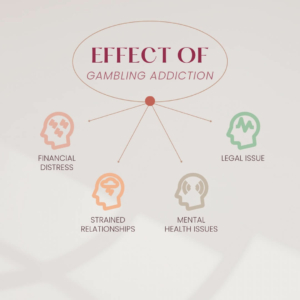Gambling addiction is a serious problem that affects millions of people worldwide. While most people gamble responsibly, for some individuals, gambling can become a compulsive behavior leading to negative consequences such as financial distress, strained relationships, and other adverse effects. Its causes are complex and multifaceted, including psychological, social, and environmental factors. Understanding the psychology behind it is crucial to addressing the issue at an individual and societal level.
This blog will explore the psychological factors contributing to gambling addiction, its impact on individuals and society, and strategies and resources for addressing it. Whether you or someone you know is struggling with this problem or simply wants to learn more about the topic, this blog is for you.

What is Gambling Addiction, and How Does it Develop?
Gambling addiction is characterized by a persistent and recurrent gambling behavior pattern leading to significant impairment or distress. Individuals with an addiction may experience a range of symptoms, including:
- Preoccupation with gambling
- Increased frequency and amount of bets
- Restlessness or irritability when trying to cut back or stop gambling
- Chasing losses
- Lying or hiding the extent of their gambling
- Jeopardizing relationships, job, or educational opportunities due to gambling
- Relying on others for financial assistance due to gambling losses
Depending on the individual’s circumstances and vulnerabilities, it can develop gradually or rapidly. Some risk factors for developing gambling addiction include:
Psychological factors
Individuals with depression, anxiety, or other mental health disorders may be more vulnerable to developing it to cope with stress or negative emotions.
Social factors
Exposure to gambling at an early age, peer pressure, or a culture that values gambling may increase the likelihood of developing this serious issue.
Environmental factors
The availability and accessibility of gambling venues and online betting can increase the risk of developing a this serious proble.
Psychological Factors Behind Gambling Addiction
Its causes are complex and multifaceted; several psychological factors contribute to the development and maintenance of the disorder. These include:
Reward-seeking behavior: It triggers the brain’s reward system, releasing dopamine and creating a sense of pleasure and excitement, reinforcing the behavior and making it difficult to stop.
Impulsivity: Individuals with a gambling addiction may struggle to control their impulses and act on a whim without considering the consequences. This can lead to excessive gambling and financial losses.
Cognitive distortions: It can lead to distorted beliefs about winning and control, making stopping difficult.
Negative emotions: It may be a coping mechanism for negative emotions like stress, anxiety, and depression, but it can exacerbate these feelings and lead to a cycle of addiction.
Addressing Gambling Addiction: Strategies and Resources
Addressing gambling addiction requires a multifaceted approach that involves individual, societal, and governmental efforts. Some strategies and resources for addressing it include:
Therapy
Cognitive-behavioral therapy, motivational interviewing, and other forms of therapy can help individuals with gambling addiction identify and change their thinking and behavior patterns.
Support groups
Peer support groups, such as Gamblers Anonymous, can provide individuals with gambling addiction a safe and supportive environment to share their experiences and receive support.
Self-help resources
Online resources, self-help books, and mobile apps can provide individuals with gambling addiction tools and strategies for managing their behavior.
Responsible gambling practices
Casinos and other gambling venues can promote responsible gambling practices, such as setting limits on bets and time spent gambling, providing information about.

I hold the prestigious role of Head of Content at Best United States Casinos, where I lead the charge in content creation and strategy. Fueled by my profound passion for casinos and backed by years of industry experience, I am a powerhouse of knowledge. My dedication shines through in my mission to craft captivating and informative content that resonates with casino enthusiasts across the globe. Whether it’s uncovering the latest trends or diving into the nuances of gameplay, I am committed to delivering top-notch content that keeps audiences engaged and informed.








